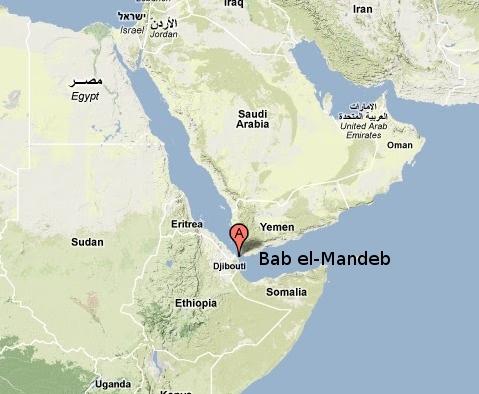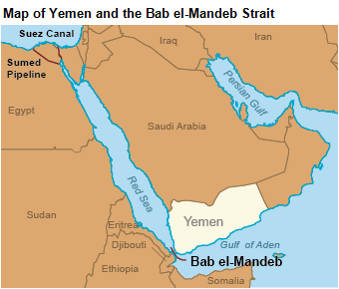sooda
Veteran Member
The Strait
Containing Threats in Bab al-Mandab
Writer : Dr. Amani el-Taweel
Monday, July 16, 2018
Currently Bab al-Mandab is witnessing an unprecedented escalation of threats endangering the global trade movement passing through the strait. The technological advancement associated with naval mines emerges as an effective tool in flaring up this threat.
While maritime threats in this region have been common throughout the last three decades in the Red Sea, yet the threat actors have changed significantly. The threats emanating from piracy and al-Shabab movement receded, while the Houthis’ threats to the strait have been on the rise.
Nature of Threats
1. Military threats: Military threats in Bab al-Mandeb have spiked since October 2017, as the Houthi militias started launching missiles and planting naval mines, as well as attacking Gulf vessels using drones. This threatened one of the vessels operated by UAE, Swift, which operated as a landing pad for troops and logistics center. In the ensuing weeks, the US Navy intercepted three similar assaults. In addition, it launched Tomahawk missile strikes to destroy the coastal radar sites responsible for gathering information needed by Houthis to carry out such attacks. https://futureuae.com/en-US/Mainpage/Item/4083/the-strait-containing-threats-in-bab-al-mandab#_edn1
Furthermore, a Saudi frigate was targeted off the Houthi-controlled port of Hodeidah at the end of January 2018 by a remotely controlled drone similar to those used by Iranian smugglers in the Strait of Hormuz. The US military ships, which cross the Strait of Hormuz, are frequently harassed by small boats from Iran’s Islamic Revolutionary Guard Corps
Navy, using an unmanned, remotely-controlled boat.
Given these risks, the US government has advised that Bab al-Mandeb Strait should be crossed during daylight hours only, amid growing threats to vessels.
2. Economic threats: According to the Annual Energy Report issued by Columbia University, the closure of Bab al-Mandeb as a waterway, even temporarily, can lead to significant increases in total energy costs and global energy prices. [ii] The closure of the strait hinder the passage of the Arabian Gulf oil through either the Suez Canal, or the Sumed pipeline, thereby increasing the transit time and cost. In addition, European and Southern African oil flows will no longer be able to reach Asian markets through the Suez Canal and Bab al-Mandeb. Based on economic forecasts, the cost of shipping will increase by USD 45 million per day, plus the higher freight costs due to the longer route taken by the
tankers by about 6000 nautical miles.
For Egypt, Bab al-Mandeb strait has an additional significance as the country maintains its electricity supply through relying on the imported liquefied natural gas passing through the strait. Egypt receives one tanker of LNG weekly passing through Bab al-Mandab, thus Egypt is concerned about any attempts to obstruct the passage to protect its LNG imports. [iii]
Threat Actors
1. The Iranian role: Iran has worked on expanding its presence in the Horn of Africa after 2006 Lebanon war, in
anticipation of regional and international reactions to the outcome of that war. As a result, Tehran worked on charting a new map for its naval influence, expanding beyond its limited presence in the Arabian Gulf and coastal waters of the Indian Ocean. Elements of the naval forces of the Islamic Revolutionary Guard Corps have been stationed in the Gulf of Aden since November 2008, when they dispatched the first warship to carry out anti-piracy patrols in response to Somali pirates seizing Iranian cargo ship. [iv]
The Iranian strategy in the Red Sea formulated in 2009 after holding the Iranian-Djiboutian summit, which was culminated with signing a memorandum of understanding for mutual cooperation. This cooperation allowed Iran to create military training centers that aimed to create what was known as the African Revolutionary Guards. In addition, the Central Bank of Iran granted loans to the Central Bank of Djibouti and the two countries agreed to establish a joint committee contributing to the development of Djibouti. [v]
continued
The StraitContaining Threats in Bab al-Mandab
Containing Threats in Bab al-Mandab
Writer : Dr. Amani el-Taweel
Monday, July 16, 2018
Currently Bab al-Mandab is witnessing an unprecedented escalation of threats endangering the global trade movement passing through the strait. The technological advancement associated with naval mines emerges as an effective tool in flaring up this threat.
While maritime threats in this region have been common throughout the last three decades in the Red Sea, yet the threat actors have changed significantly. The threats emanating from piracy and al-Shabab movement receded, while the Houthis’ threats to the strait have been on the rise.
Nature of Threats
1. Military threats: Military threats in Bab al-Mandeb have spiked since October 2017, as the Houthi militias started launching missiles and planting naval mines, as well as attacking Gulf vessels using drones. This threatened one of the vessels operated by UAE, Swift, which operated as a landing pad for troops and logistics center. In the ensuing weeks, the US Navy intercepted three similar assaults. In addition, it launched Tomahawk missile strikes to destroy the coastal radar sites responsible for gathering information needed by Houthis to carry out such attacks. https://futureuae.com/en-US/Mainpage/Item/4083/the-strait-containing-threats-in-bab-al-mandab#_edn1
Furthermore, a Saudi frigate was targeted off the Houthi-controlled port of Hodeidah at the end of January 2018 by a remotely controlled drone similar to those used by Iranian smugglers in the Strait of Hormuz. The US military ships, which cross the Strait of Hormuz, are frequently harassed by small boats from Iran’s Islamic Revolutionary Guard Corps
Navy, using an unmanned, remotely-controlled boat.
Given these risks, the US government has advised that Bab al-Mandeb Strait should be crossed during daylight hours only, amid growing threats to vessels.
2. Economic threats: According to the Annual Energy Report issued by Columbia University, the closure of Bab al-Mandeb as a waterway, even temporarily, can lead to significant increases in total energy costs and global energy prices. [ii] The closure of the strait hinder the passage of the Arabian Gulf oil through either the Suez Canal, or the Sumed pipeline, thereby increasing the transit time and cost. In addition, European and Southern African oil flows will no longer be able to reach Asian markets through the Suez Canal and Bab al-Mandeb. Based on economic forecasts, the cost of shipping will increase by USD 45 million per day, plus the higher freight costs due to the longer route taken by the
tankers by about 6000 nautical miles.
For Egypt, Bab al-Mandeb strait has an additional significance as the country maintains its electricity supply through relying on the imported liquefied natural gas passing through the strait. Egypt receives one tanker of LNG weekly passing through Bab al-Mandab, thus Egypt is concerned about any attempts to obstruct the passage to protect its LNG imports. [iii]
Threat Actors
1. The Iranian role: Iran has worked on expanding its presence in the Horn of Africa after 2006 Lebanon war, in
anticipation of regional and international reactions to the outcome of that war. As a result, Tehran worked on charting a new map for its naval influence, expanding beyond its limited presence in the Arabian Gulf and coastal waters of the Indian Ocean. Elements of the naval forces of the Islamic Revolutionary Guard Corps have been stationed in the Gulf of Aden since November 2008, when they dispatched the first warship to carry out anti-piracy patrols in response to Somali pirates seizing Iranian cargo ship. [iv]
The Iranian strategy in the Red Sea formulated in 2009 after holding the Iranian-Djiboutian summit, which was culminated with signing a memorandum of understanding for mutual cooperation. This cooperation allowed Iran to create military training centers that aimed to create what was known as the African Revolutionary Guards. In addition, the Central Bank of Iran granted loans to the Central Bank of Djibouti and the two countries agreed to establish a joint committee contributing to the development of Djibouti. [v]
continued
The StraitContaining Threats in Bab al-Mandab


